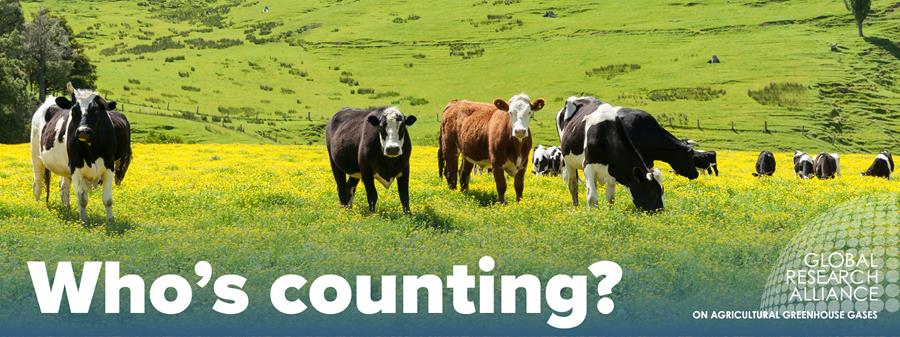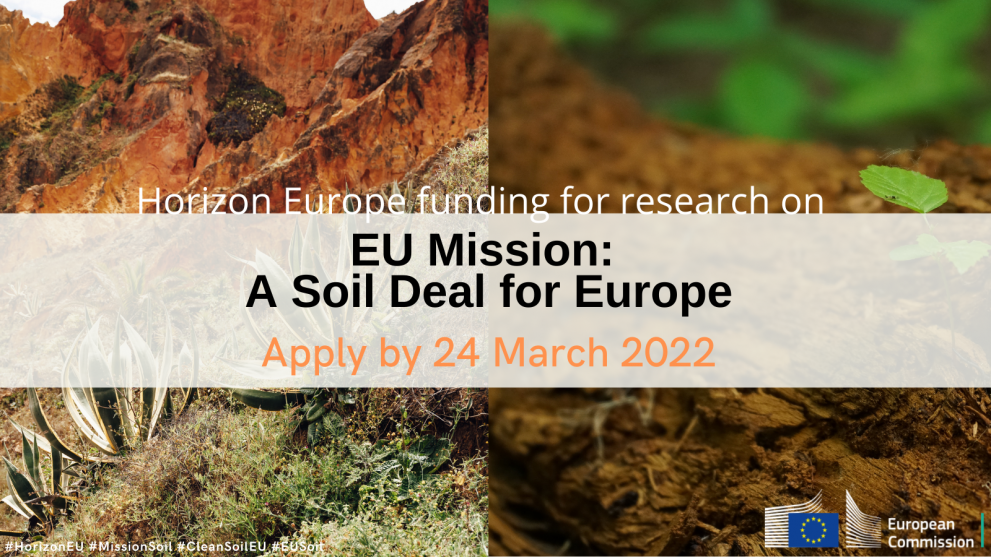The March 2022 Issue of Who’s Counting, the Inventories and Nationally Determined Contributions (NDC) Network Newsletter is now available to view HERE.

In Who’s Counting this quarter…
The I&NDC Network welcomes two new co-leads; two databases of emission factors and parameters for manure CH4 and soil N2O are publicly available and continually seeking data contributions; New Zealand scientists communicate new findings from research on mapping and managing N2O emissions from urine patches; and the I&NDC Network held the first successful meeting of National Agriculture Inventory Compilers in January. More 2022 Network events and activities to be announced, please subscribe below to stay notified!
We encourage you to directly submit content for the next Issue of Who’s Counting, or contact one of the Inventories and NDC Network co-leads directly. To receive future issues of this Newsletter subscribe here.
The European Commission is looking for the best innovative ideas to advance the protection and restoration of soils in Europe and beyond. The deadline to apply is 24 March 2022.

The European Commission is looking for the best innovative ideas to advance the protection and restoration of soil health in Europe. The total available budget is € 62 million.
Learn more HERE.
NZAGRC, Manaaki Whenua – Landcare Research (MWLR), Pastoral Robotics Limited and AgResearch in New Zealand are exploring targeted management of urine patches deposited directly onto pasture by grazing animals, which is the primary source of direct N2O and indirect N2O emissions in these systems (from deposition of volatilised ammonia and leached nitrate).
This work is important to determine cost savings from potentially applying significantly less inhibitor technologies to targeted areas, as opposed to applying the treatment over large unaffected areas. Critical factors to estimate emissions from urine patches were also determined. Findings supported existing scientific knowledge in this field that simulated urine patches (often uniformly wetted) do not correctly emulate natural dispersion of urine patches and thus provided new insights for better emission estimation from N2O emissions from grazing animals.
The 2022 meeting of the Croplands Research Group was held on 19 January 2022.
The meeting was attended by 36 participants, representing 15 GRA member countries, and invited experts. The meeting report and recordings of the online sessions are now available for download HERE.
On 17 January 2022, the Inventories and Nationally Determined Contributions (INDC) Network hosted a virtual meeting of National Agriculture Sector Inventory Compilers. Thirty-five countries were represented by their national agriculture inventory compiler, spanning Africa, Europe, LAC and Asia, North America and Oceania.
The objectives of the meeting were to facilitate networking and information exchange, to discuss common issues faced in agriculture inventory compilation and to determine how the Network may best assist participants with these and inventory improvements.
Read more about the meeting outcomes and download the meeting report by clicking HERE.
Location: Müncheberg, Germany
Closing Date: 6 March 2022
Learn more here:
A recording of the February 2022 Manure Management Network Webinar, titled “Development of bio-based fertilisers for a circular bioeconomy”, is now available to view.
This webinar session included presentations from:
Patrick Forrestal (Teagasc, Ireland): “Opportunities and challenges of meeting crop and soil nutrient requirements using bio-based fertilisers”
Laia Llenas Argelaguet (UVIC-UCC, Spain): “From farm to market: Upcycling manure to improved fertilising products”
Lars Stoumann Jensen (University of Copenhagen, Denmark): “Developing new bio‐based fertilisers from organic waste upcycling for optimal use in agriculture – and training a new generation of scientists for the challenge! Insights from the LEX4BIO and FertiCycle EU projects.”
Being a successful scholar today requires scientists to deliver their insights beyond the academic community and show that their research has real-world value. But how can scientists better communicate their research, data and analysis? We ask this question in the first part of the 2022 CLIFF-GRADS Science Collaboration series and seek answers together with science communications experts.
The online event series kicked off with speaker Jonathan Schwabish, an economist and science communications expert at the Urban Institute, who shared his insights about the fundamentals of an effective science communication strategy. The topics he covered included content hierarchy, strategic planning, and audience analysis. He recently published the book “Elevate the debate: A multi-layered approach to communicating your research”, which served as the basis for discussions at the first session of our event series. This blog provides an overview of the main points from the event.
The September/October 2021 edition of the Soil Science Society of America Journal (SSSAJ) features a special section titled “The Role of Conservation Agricultural Practices on Reducing Greenhouse Gas Emissions and Enhancing C Sequestration“.
The section brings together studies from across the globe and was edited by Craig Drury (Agriculture & Agri-Food Canada, Ontario Canada), Chuck Rice (Kansas State University, Kansas USA) and Jane Johnson (United States Department of Agriculture, Minnesota, USA). The editors had the idea for a SSSAJ special section in 2019 at the Global Research Alliance’s (GRA) meeting of the Croplands Research Group and implementation has been led by the Conservation Agriculture Network.
Ten peer-reviewed papers are published in the special section. They include seven field studies, two modeling studies (using field data), and one meta-analysis paper. The conservation agriculture (CA) practices covered in these manuscripts include conservation tillage, crop rotations, cover crops, and residue management. Several studies include a combination of CA practices (e.g., two papers included both tillage and residue management treatments). The research represents field sites in four countries (United States, Canada, Argentina, and Denmark) across three continents (North and South America and Europe). The meta-analysis study uses published data from 121 field sites in 19 countries across six continents. Collectively, these articles provide examples of CA benefits related to reducing N2O emissions and enhancing C sequestration in soils.
We are pleased to announce a new in-depth assessment of ten leading compounds being studied for efficacy to methane mitigation in ruminant livestock. The analysis assesses the most promising compounds for mitigating ruminant methane emissions.
The report aims to inform policymakers, industry investors and feed industry advisers on the effectiveness, applicability, and broader commercial issues surrounding methane reducing feed additives.
This concise resource can guide investment and management decisions by all actors in the livestock supply chain.
Key findings of the 10 reviewed additive groups
- Only two additives (3-Nitrooxypropanol) and dried Asparagopsis (red algae) have routinely delivered over 20% mitigation of enteric methane by the consuming ruminants. Dietary nitrate is the third most effective additive and can safely deliver 10% or more mitigation when consumed. The other classes of additive cannot be expected to deliver 10% mitigation when fed.
- Two major constraints for all reviewed additives achieving substantial global impact on livestock emissions in the immediate future, include:
- Insufficient evidence to show any of these additives will increased production while decreasing methane output.
- Almost all studies relied on additives mixed into a total mixed ration. There is almost no evidence of the efficacy of administering additives as a supplement, as in rangeland systems.
- Further research is needed to establish a business case for on-farm use of these additives.
- A small survey of the actors in the feed additive pipeline from the manufacturers through feed millers to livestock managers, shows:
- A poor understanding of the efficacy and co-benefits of potential additives.
- All livestock managers recognized they need more information on additives.
- No additive manufacturers identified the grazing industry as a high priority market for a methane mitigating product.
Please share with your networks!
Title: “Fate of antibiotic residues and antibiotic resistant bacteria in livestock manure and their effects on greenhouse gas emissions and nutrient cycling”
Closing Date: Monday, 31 January 2022
Learn more HERE.
About the position:
Imprudent use of antibiotics is increasing in livestock production systems in low- and middle-income countries, with potentially severe consequences for human, animal, and environmental health. However, little is known about the fate of antibiotic residues in livestock manure in smallholder farm settings under traditional manure management systems. Bacteria that are resistant to antibiotics can spread into and across the environment through livestock manure, posing a health hazard that needs to be addressed. In addition, livestock manure is a source of greenhouse gas (GHG) emissions that contribute to global warming. To achieve sustainable livestock development pathways in East Africa, it is important to understand the impact of livestock production on the environment (GHG emissions as well as animal and human health impacts).
Despite potentially negative aspects of livestock manure, it is an important resource for smallholder farmers. It can be used as crop fertilizer, thereby reducing the need for expensive synthetic fertilizer, and is beneficial for soil fertility and stability. Understanding if and how antibiotic residues and antibiotic-resistant bacteria affect nutrient cycling during manure storage and field application is critical. Because GHGs are formed during microbially-mediated processes, the presence of antibiotic residues and resistant organisms can influence the magnitude of GHG emissions and the fertilizer quality of the manure. Manure management practices that both reduce antibiotic resistance and GHG emissions and are practical for smallholder farmers are urgently needed to stop the spread of AMR and to mitigate climate change.
To address these research gaps, ILRI seeks to recruit a PhD graduate fellow to investigate how the presence of antibiotic residues and antibiotic resistant bacteria affect GHG emissions and nutrient cycling in manure in different livestock production systems in Kenya, and how manure management interventions can help to reduce both GHG emissions and antibiotic resistance. To answer these research questions, the candidate will conduct a series of lab and on-farm experiments. The gained knowledge will help to prioritize good livestock adaptation and mitigation options in relevant livestock systems and help to build capacity in decision support and planning in East Africa.
Learn more HERE.
A recording of the December 2021 Croplands Research Group Webinar, titled “Mediterranean agroforestry and climate change”, is now available to view.
This webinar session featured a presentation from Dr. Anastasia Pantera (Agricultural University of Athens).
Click HERE to view the webinar recording.
